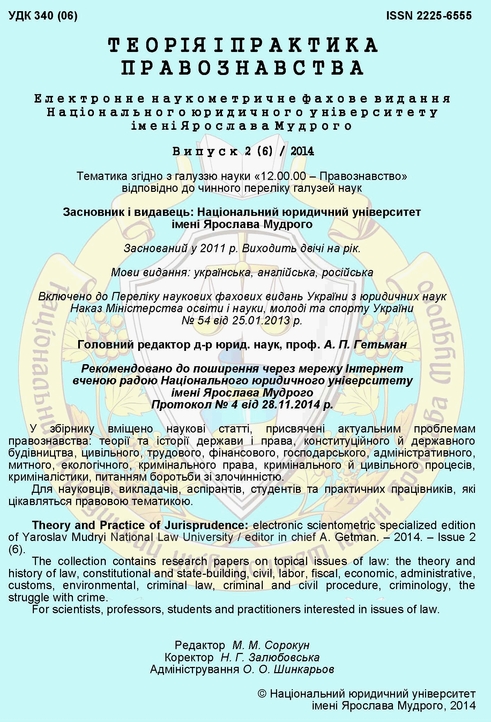Theoretical basis of european integration
DOI:
https://doi.org/10.21564/2225-6555.2014.2.63681Keywords:
European integration, the concept and characters of European integration, the European UnionAbstract
The article is devoted to the research in theoretical basis of European integration. The stated problem is not quite studied in the domestic legal science that determines its actuality. The article marks out definite sequence of stages (preferential trade agreements → free trade area → custom’s union → common market → monetary union → political integration) which characterize orientation of European integration. The main approaches to the definition of European integration are studied and its features are marked out (the EU is distinguished from the rest of the world and relatively separates from it; the EU institutional mechanism comprises supranational and intergovernmental institutions, balance of powers of which is determined by the tasks of the stated stage of integration; the EU is based on supranational law which is the background for regional legal system forming; clear definition of the aims and tasks of integration is typical for the EU and, correspondently, there is definite consequence of carried stages of integration of socio-economic and political-legal systems of the Member States). The author specifies the system of criteria which allows comparing different intergovernmental units: matching a region as the subject which possesses legal subjectiveness; existence of the system of common values as the basis for regional identity formation; socio-economic homogeneity of the Member States; formation of the institutional mechanism with the elements of supranationality; compliance with consequence of the integration stages; developed law of the community; providing
synchronization of the processes of socio-economic and political integration; realization of coordinated and ideally, common foreign and defense policy. On the basis of the analysis the conclusion about the unifying initiatives spreading on the different countries of different world regions in the end of the XXth century was made. Integration has become one of the basis, and simultaneously objectization of changes in the governmental-legal development of these countries. At the same time integration characteristics of the EU are not always intrinsical to other integration units, and this generates methodological problem for their comparison. Key words: European integration, the concept and characters of European integration, the European Union.
References
Байков А. А. «Интеграционные маршруты» Западно-Центральной Европы и
Восточной Азии / А. А. Байков // Международные процессы. – 2007. – Т. 5. – № 3 (15). –
С. 4–17.
Бурганова И. Н. Политическая интеграция на постсоветском пространстве:
проблемы и перспективы : дис. … канд. полит. наук : 23.00.04 / Инна Николаевна Бурганова.
– СПб., 2007. – 188 с.
Буторина О. Понятие региональной интеграции : новые подходы / О. Буторина
// Космополис. – 2005. – № 3 (13). – С. 136–145.
Вахитова Т. М. Особенности современных интеграционных процессов
в условиях глобализации мировой экономики [Электронный ресурс] / Т. М. Вахитова //
Проблемы современной экономики. – 2002. – № 1. – Режим доступа : http://www.meconomy.ru/art.php3?artid=11345.
Гуляева К. В. Становление интеграционных моделей Европейского Союза
и Содружества Независимых Государств : дис. ... канд. полит. наук : 23.00.04 / Ксения
Витальевна Гуляева. – СПб., 2010. – 189 с.
Дарендорф Р. Объединенная или открытая? Европейская альтернатива /
Р. Дарендорф // Прогнозис. – 2007. – № 2 (10). – С. 14–24.
Зуев В. Н. Наднациональный механизм как фактор развития экономической
Теорія і практика правознавства. – Вип. 2 (6) / 2014 До 210-річчя Університету
интеграции в Европейском Союзе : автореф. дис. ... д-ра экон. наук : 08.00.14 [Электронный
ресурс] / Владимир Николаевич Зуев. – М., 2011. – 47 с. – Режим доступу:
http://www.ieras.ru/diss27.htm.
Киреева С. А. Межгосударственная интеграция как внешняя функция
Российского государства : дис. … д-ра юрид. наук : 12.00.01 / Светлана Александровна
Киреева. – Астрахань, 2006. – 499 с.
Коростышевская Е. М. Научно-производственная интеграция: политико-
экономическое исследование : дис. ... д-ра экон. наук : 08.00.01 / Елена Михайловна
Коростышевская. – СПб., 1999. – 310 с.
Лотман Ю. М. Структура художественного текста / Ю. М. Лотман. – М. :
Искусство, 1970. – 384 с.
Панарина Е. А. Развитие идеи европейской интеграции в первой половине XX
века : дис. … канд. ист. наук : 07.00.03 / Елена Александровна Панарина. – Ставрополь,
– 279 с.
Райзберг Б. А. Современный экономический словарь / Б. А. Райзберг, Л. Ш.
Лозовский, Е. Б. Стародубцева. – М. : ИНФРА-М, 1997. – 479 с.
Стрежнева М. В. Региональные политические институты: на примере
Европейского Союза и Содружества Независимых Государств. Социокультурный аналіз :
дис. ... д-ра полит. наук : 23.00.04 / Марина Вадимовна Стрежнева. – М., 2000. – 300 с.
Черковец О. В. Развитие региональной и субрегиональной экономической
интеграции в современном мире : дис. ... д-ра эконом. наук : 08.00.14 / Олег Викторович
Черковец. – М., 1998. – 297 с.
Яковюк І. В. Правові основи інтеграції до ЄС: загальнотеоретичний аналіз /
І. В. Яковюк. – Х. : Право, 2013. – 760 с.
Beeson M. Regionalism and Globalization in East Asia: Politics, Security, Economic
Development / M. Beeson. – New York : Palgrave Macmillan, 2007. – 324 p.
Corbey D. Dialectical functionalism: stagnation as a booster of European integration
/ D. Corbey // International Organization. – 1995. – Vol. 49. – № 2. – Р. 253–284.
Etzioni A. Political unification: a comparative study of leaders and forces /
А. Etzioni. – New York : Rinehart, 1965. – 329 p
Downloads
How to Cite
Issue
Section
License
Copyright (c) 2016 Теорія і практика правознавства

This work is licensed under a Creative Commons Attribution 4.0 International License.




